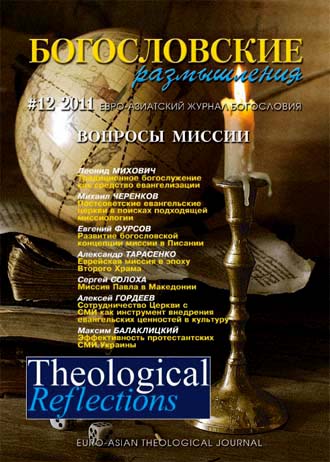Развитие богословской концепции миссии в Писании
Keywords:
Богословская концепция миссии в Писании, целостность концепции миссии, миссия искупительная, миссионерского отношения Церкви к мируAbstract
В основе традиционного понимания миссии лежит Великое поручение Христа в Ев. Мф. 28:19-20. В следствии этого миссия часто считается достоянием эры Нового завета что в определенном смысле ограничивает ее понимание. Данная статья рассматривает развитие концепции миссии в Писании с целью определить каким образом Ветхий и Новый Завет представляют целостность концепции миссии. В первой части статьи автор рассматривает завет Бога с Ноем, Авраамом, а также Синайский завет, делая акцент на миссионерскую природу заветов. Ветхий Завет указывает на то, что с богословской перспективы миссия по своему характеру является искупительной. Во второй части исследуется миссионерское отношение Бога к миру, а так же поднимается вопрос миссионерского отношения Церкви к миру. Таким образом миссия Церкви заключается не только в том, чтобы исполнять Великое поручение "идти", но так же в том, чтобы "быть". В данных рамках миссия Церкви может приобретать различные формы отвечая на физические, эмоциональные и духовные нужды людей.
References
- Bosch, David, Transforming Mission (New York: Orbis Books, 1991).
- Dorr, D., Mission in Today’s World (New York: Orbis Books, 2000).
- DuBose, Francis M., God Who Sends (Nashville: Broadman Press, 1983).
- Goheen, Michael W., ‘As the Father Has Sent Me, I Am Sending You: Lesslie Newbigin's Missionary Ecclesiology’, International Review of Mission, 91 no 362 Jl., (2002).
- Kaiser, Jr. Walter C., Mission in the Old Testament: Israel as a Light to the Nations (Baker Books, 2000).
- Karotemprel, S., Following Christ in Mission (Boston: Pauline Books & Media, 1996).
- Klaiber, Walter, Call and Response (Nashville: Abingdon Press, 1990).
- Kogan, M. ‘Abrahamic Faith’ in McLean, George, F., (chief ed.), Abrahamic Faiths, Ethnicity, and Ethnic Conflicts (The Council for Research in Values and Philosophy, 1997).
- Longman III, T., How to Read Genesis (Downers Grove: InterVarsity Press, 2005).
- Messer, Donald E., A Conspiracy of Goodness (Nashville: Abingdon Press, 1992).
- Moltmann, Jurgen, The Church in the Power of the Spirit: A Contribution to Messianic Ecclesiology (Minneapolis: Fortress Press, 1977).
- Montgomery, H.B., The Bible and Missions (Texas: Baylor University Press, 2009).
- Penner, P., Bible and Mission (Schwarzenfeld: Neufeld Verlag, 2008).
- Routledge R., Bible and Mission (Schwarzenfeld: Neufeld Verlag, 2008).
- Rzepkowski, H., The Theology of Mission (Verbum SVD vol. 15, 1974).
- Scherer, James A., Gospel, Church, & Kingdom (Minneapolis: Augsburg Publishing House, 1987).
- Verster, Pieter, A Theology of Christian Mission (Lewiston: The Edwin Mellen Press, 2008).
- Vicedom, Georg, F., The Mission of God (Saint Louis: Concordia Publishing, 1965).
- Webber, Robert E., Journey to Jesus’ (Nashville: Abingdon Press, 2001).
- Wells, Jo Bailey, ‘God’s Holy People: A Theme in Biblical Theology’, JSOT Supplements 305, Sheffield, (2000).
- Wolanin, Adam, S.J., ‘Trinitarian Foundation of Mission’ in Karotemprel S., (chief ed.), Following Christ in Mission (Boston: Pauline Books & Media, 1996).
- Wright, Christopher J.H., The Mission of God (Nottingham: InterVarsity Press, 2006).
- Yoder, Perry B., ‘The Noachide covenant and Christian Mission’, in Schertz, Mary H., and Friesen, Ivan, (eds.), Beautiful Upon the Mountains (Elkhart: Herald Press, 2003).
Downloads
How to Cite
Issue
Section
License
Copyright (c) 2020 Евгений ФУРСОВ

This work is licensed under a Creative Commons Attribution-NonCommercial 4.0 International License.
All articles published in the Journal are distributed under a Creative Commons Attribution-NonCommercial 4.0 International License
By submitting an article for publication in Theological Reflections: Eastern European Journal of Theology the author grants the editors the right to publish the article and distribute it in electronic and print form.
The author reserves all copyrights and the right to use the materials of the article in whole or in part for educational purposes, to write his own dissertations, to prepare abstracts, conference reports, oral presentations, etc., as well as post electronic copies of articles (including the final electronic version downloaded from the journal’s official website) on non-commercial web-resources without the consent of the editorial board and founders.



